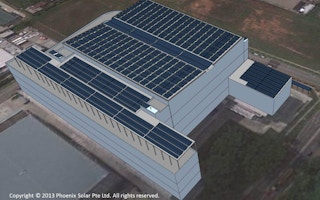Phoenix Solar on Monday announced that it will design and build the biggest photovoltaic (PV) system in Singapore for supermarket giant Sheng Siong Group.
To continue reading, subscribe to Eco‑Business.
There's something for everyone. We offer a range of subscription plans.
- Access our stories and receive our Insights Weekly newsletter with the free EB Member plan.
- Unlock unlimited access to our content and archive with EB Circle.
- Publish your content with EB Premium.
The solar project, which will be completed by year-end, is for CMM Marketing Management Pte Ltd, a wholly owned subsidiary of the Singapore-listed supermarket retailer.
Phoenix Solar, an international photovoltaic system integrator with headquarters in Germany and an Asia Pacific branch in Singapore, will install the PV system on the roof of the main office and distribution centre of CMM, which covers an area of 11,000 square metres.
The project has an estimated capacity of 1.2 megawatt-peak of renewable energy. This is equivalent to switching 15 per cent of the marketing and distribution firm’s current fossil fuel-powered electricity consumption to solar energy.
This also mitigates at least 730 metric tonnes of carbon dioxide emissions per year from Singapore’s gas-fired power plants, said Phoenix Solar.
Currently, there are over 60 PV systems in the country, according to the National Solar Repository of Singapore, and Phoenix Solar is one of eight system integrators on the agency’s list.
To date, the biggest PV system installed in Singapore is at Keppel Seghers Ulu Pandan, a wastewater recycling plant, with one megawatt grid-tied solar PV system. Singaporean solar integrator SolarGy did the project.
The second biggest is a 505-plus kilowatt-peak system at Resorts World Sentosa, also by SolarGy, followed by a 435kWp system in Greenpac, an eco-friendly packaging firm, by Phoenix Solar.
Phoenix Solar’s latest project demonstrates an increasing demand for bigger PV systems in the city-state. Due to ample production of photovoltaic modules around the world, costs are now greatly reduced, making industrial installations of rooftop PV systems economically viable.
Such a system in Singapore can pay for itself in seven to ten years, amounting to an unlevered project IRR (an internal rate of return before interests and taxes are paid) of eight to 13 per cent, said Phoenix Solar.
Christophe Inglin, managing director of Phoenix Solar, said, “Thanks to the attractive returns on investment, we expect the installed PV capacity of Singapore to more than double in 2013, reaching at least 20 megawatts by December.”
“The commercial and environmental returns of this project make it a viable business decision, which will continue to yield benefits for a long time,” Lim Hock Chee, Sheng Siong chief executive, added.










